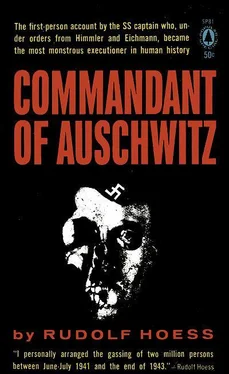I do not know what induced the Jews to give such information. Was it for reasons of personal revenge, or were they jealous that those others should survive?
The attitude of the: men of the Special Detachment was also strange. They were all well aware that once the actions were completed they, too, would meet exactly the same fate as that suffered by these thousands of their own race, to whose destruction they had contributed so greatly. Yet the eagerness with which they carried out their duties never ceased to amaze me. Not only did they never divulge to the victims their impending fate, and were considerately helpful to them while they undressed, but they were also quite prepared to use violence on those who resisted. Then again, when it was a question of removing the troublemakers and holding them while they were shot, they would lead them out in such a way that the victims never saw the noncommissioned officer standing there with his gun ready, and he was able to place its muzzle against the back of their necks without their noticing it. It was the same story when they dealt with the sick and the invalids, who could not be taken into the gas chambers. And it was all done in such a matter-of-course manner that they might themselves have been the exterminators.
Then the bodies had to be taken from the gas chambers, and after the gold teeth had been extracted, and the hair cut off, they had to be dragged to the pits or to the crematoria. Then the fires in the pits had to be stoked, the surplus fat drained off, and the mountain of burning corpses constantly turned over so that the draught might fan the flames.
They carried out all these tasks with a callous indifference as though it were all part of an ordinary day’s work. While they dragged the corpses about, they ate or they smoked. They did not stop eating even when engaged on the grisly job of burning corpses which had been lying for some time in mass graves.
It happened repeatedly that Jews of the Special Detachment would come upon the bodies of close relatives among the corpses, and even among the living as they entered the gas chambers. They were obviously affected by this, but it never led to any incident.
I myself saw a case of this sort. Once when bodies were being carried from a gas chamber to the fire pit, a man of the Special Detachment suddenly stopped and stood for a moment as though rooted to the spot. Then he continued to drag out a body with his comrades. I asked the Capo what was up. He explained that the corpse was that of the Jew’s wife. I watched him for a while, but noticed nothing peculiar in his behavior. He continued to drag corpses along, just as he had done before. When I visited the Detachment a little later, he was sitting with the others and eating, as though nothing had happened. Was he really able to hide his emotions so completely, or had he become too brutalized to care even about this?
Where did the Jews of the Special Detachment derive the strength to carry on night and day with their grisly work? Did they hope that some whim of fortune might at the last moment snatch them from the jaws of death? Or had they become so dulled by the accumulation of horror that they were no longer capable even of ending their own lives and thus escaping from this “existence”?
I have certainly watched them closely enough, but I have never really been able to get to the bottom of their behavior. [82]
The Jew’s way of living and of dying was a true riddle that I never managed to solve.
All these experiences and incidents which I have described could be multiplied many times over. They are excerpts only, taken from the whole vast business of the extermination, sidelights as it were.
This mass extermination, with all its attendant circumstances, did not, as I know, fail to affect those who took a part in it. With very few exceptions, nearly all of those detailed to do this monstrous “work,” this “service,” and who, like myself, have given sufficient thought to the matter, have been deeply marked by these events.
Many of the men involved approached me as I went my rounds through the extermination buildings, and poured out their anxieties and impressions to me, in the hope that I could allay them.
Again and again during these confidential conversations I was asked: is it necessary that we do all this? Is it necessary that hundreds of thousands of women and children be destroyed? And I, who in my innermost being had on countless occasions asked myself exactly this question, could only fob them off and attempt to console them by repeating that it was done on Hitler’s order. I had to tell them that this extermination of Jewry had to be, so that Germany and our posterity might be freed forever from their relentless adversaries.
There was no doubt in the mind of any of us that Hitler’s order had to be obeyed regardless, and that it was the duty of the SS to carry it out. Nevertheless we were all tormented by secret doubts.
I myself dared not admit to such doubts. In order to make my subordinates carry on with their task, it was psychologically essential that I myself appear convinced of the necessity for this gruesomely harsh order.
Everyone watched me. They observed the impression produced upon me by the kind of scenes that I have described above and my reactions. Every word I said on the subject was discussed. I had to exercise intense self-control in order to prevent my innermost doubts and feelings of oppression from becoming apparent.
I had to appear cold and indifferent to events that must have wrung the heart of anyone possessed of human feelings. I might not even look away when afraid lest my natural emotions got the upper hand. I had to watch coldly, while the mothers with laughing or crying children went into the gas chambers.
On one occasion two small children were so absorbed in some game that they quite refused to let their mother tear them away from it. Even the Jews of the Special Detachment were reluctant to pick the children up. The imploring look in the eyes of the mother, who certainly knew what was happening, is something I shall never forget. The people were already in the gas chamber and becoming restive, and I had to act. Everyone was looking at me. I nodded to the junior noncommissioned officer on duty and he picked up the screaming, struggling children in his arms and carried them into the gas chamber, accompanied by their mother who was weeping in the most heart-rending fashion. My pity was so great that I longed to vanish from the scene; yet I might not show the slightest trace of emotion.
I had to see everything. I had to watch hour after hour, by day and by night, the removal and burning of the bodies, the extraction of the teeth, the cutting of the hair, the whole grisly, interminable business. I had to stand for hours on end in the ghastly stench, while the mass graves were being opened and the bodies dragged out and burned.
I had to look through the peephole of the gas chambers and watch the process of death itself, because the doctors wanted me to see it.
I had to do all this because I was the one to whom everyone looked, because I had to show them all that I did not merely issue the orders and make the regulations but was also prepared myself to be present at whatever task I had assigned to my subordinates.
The Reichsführer SS sent various high-ranking Party leaders and SS officers to Auschwitz so that they might see for themselves the process of extermination of the Jews. They were all deeply impressed by what they saw. Some who had previously spoken most: loudly about the necessity for this extermination fell silent once they had actually seen the “final solution of the Jewish question.” I was repeatedly asked how I and my men could go on watching these operations, and how we were able to stand it.
My invariable answer was that the iron determination with which we must carry out Hitler’s orders could only be obtained by a stifling of all human emotions. Each of these gentlemen declared that he was glad the job had not been given to him.
Читать дальше












